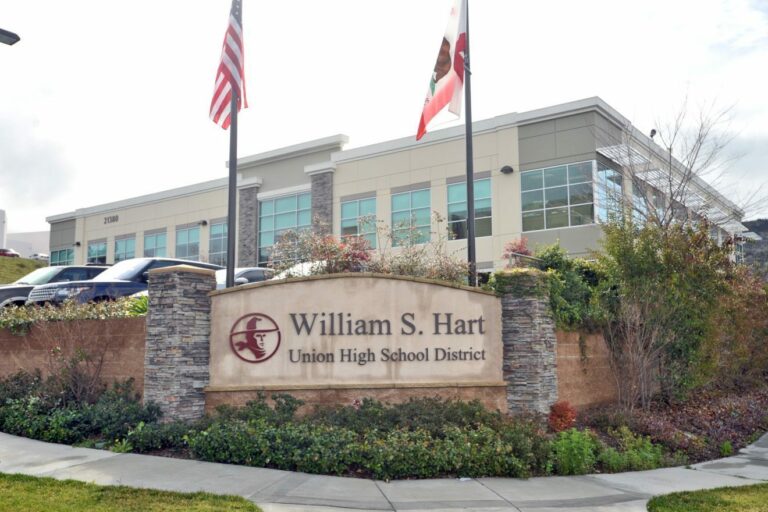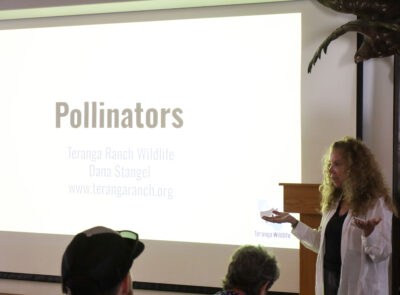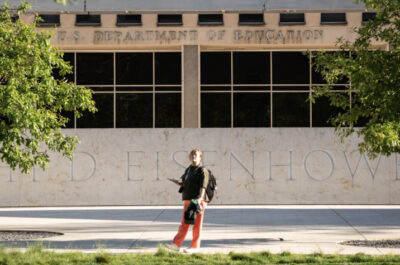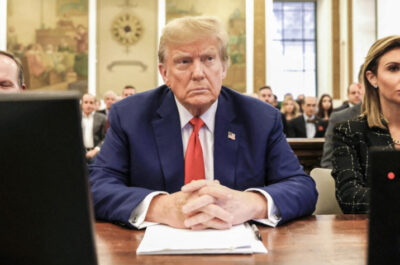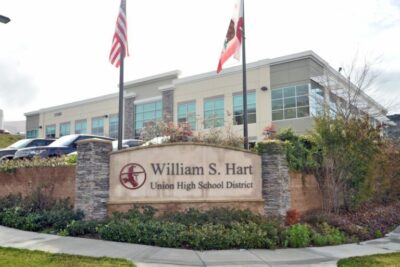In public comment, critics take issue with draft policies on flags, parental rights, other ‘controversial issues’
Community members, board members and teachers debated a series of policy changes for the William S. Hart Union High School District on Wednesday, with reactions that highlighted conflicting views on the rights of parents, students and educators.
In sometimes heated exchanges, public comments focused on district policy changes covering a range of topics including the displays of flags and banners in classrooms, parents’ right to know, recognition of religious beliefs and customs, and the district’s approach to “controversial issues.”
It was the board’s first reading of five separate policies. No formal vote was taken on those policies, which are expected to be brought back with revisions to a future board meeting. If approved, the policies will go into effect at all Hart district high and junior high schools.
In the same meeting, the board voted 5-0 to approve the second reading of six other policy revisions.
The three strategic goals set in place for such policies are aimed to focus on student learning and instruction, access and equity, and communication and collaboration, according to the board meeting agenda.
But some teachers, parents and students argued that the proposed policies are not in the best interest of the Hart district community and its students.
Policy 6145.82, which covers “School Sponsored Events — Flags and Banners,” drew several public comments. The purpose of the policy is to outline the guidelines for the display of flags and banners, and when such a display of symbols can be interpreted as a representation of the district or governing board’s position.
In the district’s proposed board policy, it states that the “American flag shall be displayed in classrooms, school main offices, and school facilities” and is also encouraged at district-sponsored events.
Other school spirit flags and banners that are not the American flag or California State flag must be approved in writing in advance by an administrator or designee, the proposed board policy states.
Exceptions include flags and banners used to support curriculum, patriotic exercises, activities that encourage civic pride and events that honor groups who have made exceptional contributions to public good, according to the policy.
Hart District Teachers Association President John Minkus called out that policy, and the others, during his opening remarks in the employee association leadership agenda item.
He said the policies were an effort to “coax” students and a “forced obvious political confrontation upon our nonpartisan district.”
He argued teacher relationships built with students are the most important factor in students’ success, and the role of the school board should be to support that.
The flag policy undermines teachers’ professional autonomy in creating a dynamic classroom environment in a way they see fit and in line with the new standards set by the state, Minkus said.
One of the district’s goals is to regain student enrollment, and “when the kids realize their ideas or ideals are being banned, they won’t feel safe, and they won’t come back to our schools,” he said, characterizing the policy as “an attack on teachers, an attack on teaching, and most importantly an attack on students.”
During information items, governing board member Erin Wilson opened the discussion: “Dividing is exactly what diverse flags do, and we’re here to unite,” she said, referring to the proposed flag and banner policy.
She cited Golden Valley High School’s motto, “Diversity is our strength. Unity is our goal,” and argued that because the district receives state and federal funding, and because its community lives in California and stands on American soil, it’s only right to have the American and state flag present at all school-sponsored events.
“We live in California, so we depict California. Not having any other flag does not by any means in my opinion, means it’s disrespectful,” governing board member Aakash Ahuja added. “I stand for no discrimination. Everybody has equal rights in schools whether they belong to a marginalized group or they don’t. Everybody has the same rights to the same education, to the same teachers, same structure.”
“It just makes things simple,” he added.
Governing board member Bob Jensen was also in favor of the policy.
Board member Joe Messina added that the policy falls in line with the California School Boards Association and has been reviewed several times before it was submitted for the first reading.
“We can have a field day with all kinds of flags. When does it stop? When do you want us to say no?” he said, and referred to the backlash the district received over the blue line flag that was displayed at several Saugus High School football games in 2022.
“Instead of turning that into a learning lesson for our kids, we called them racists right off the bat,” Messina said. “Is that really our community?” he asked, and then added that is why the policy states what it does — because there has been previous controversy in the past that they are trying to avoid in the future.
Policy 6144, focusing on “controversial issues,” was also discussed. The proposed policy states students should have opportunities to discuss topics including those with political, social, or economic significance with the goal of learning to gather and organize pertinent facts, discriminate between fact and fiction, and draw intelligent conclusions and respect the opinion of others.
Board President Cherise Moore said she had concerns with some of the proposed policies’ wording that can make the district vulnerable to lawsuits.
“There are some legal decisions that relate to personal space within a classroom that we have to understand that are teachers’ rights,” she said referring to Item D of the proposed flag and banner policy, which reads, “This specific policy is not intended to regulate signage in classroom.”
She then asked that the proposed policies be reviewed, and changes be considered before the second reading.

